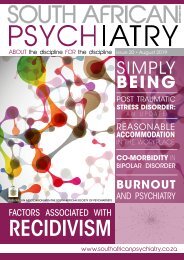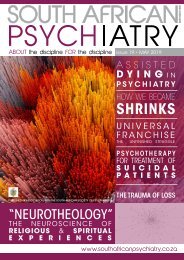South African Psychiatry - February 2019
South African Psychiatry - February 2019
South African Psychiatry - February 2019
You also want an ePaper? Increase the reach of your titles
YUMPU automatically turns print PDFs into web optimized ePapers that Google loves.
FROM THE EDITOR<br />
Dear Reader,<br />
Welcome to our first issue for <strong>2019</strong>. The year is well underway. Since the<br />
last issue I had a response from the Department of Higher Education and<br />
Training (DoHET) regarding accreditation. The outcome did not surprise –<br />
not recommended. At one level I can understand the DoHET’s requirement<br />
for a certain conformity of content - and process - that is recognized as<br />
scientific, and thus worthy of accreditation. However, the outcome got me<br />
wondering how much bad science is published in peer reviewed journals,<br />
accredited by the DoHET, that is subsequently rewarded with subsidy? I<br />
suppose that depends on one’s definition of bad science. Another way<br />
of looking at it is how much good science does not see the light of day?<br />
I suppose the distinction between good and bad rests at the foot of peer review – and editorial<br />
discretion. Certainly the merits of peer review are not infrequently discussed in the scientific literature.<br />
Clearly for good reason. The process is an area of contention albeit an accepted requirement for<br />
acceptance for publication and ultimately deemed an absolute requirement for a publication’s<br />
scientific credentials. The ability of a peer reviewer to reject or accept publication can have<br />
significant consequences for researchers. Bias is hard to control for, but I am not sure that we are<br />
ready for the move to non-peer reviewed content that is subject to the scrutiny of the consumer<br />
who decides whether an article has utility or not – subject to any such data having been the<br />
outcome of a valid review of both methodological and ethical components of the study protocol.<br />
And who controls for that I wonder? Then there is the thorny issue of the relationship with industry.<br />
Industry adverts are an absolute no-no in scientific publications deemed suitable for inclusion by<br />
the DoHET, but industry sponsored drug trials are seemingly ok…albeit that inherent bias in reporting<br />
has been consistently shown in terms of favouring the product of the sponsoring company. Most<br />
importantly such content must be peer reviewed, and should not be accompanied by an actual<br />
advert. Maybe so called drug trials should simply appear in a repository and not be published<br />
in journals? Maybe we should do away with journals altogether, and have repositories of studies<br />
conducted at universities or institutions freely available in the interests of science to all who would<br />
seek them out – but contained in a directory of such work that would direct clinicians or researchers<br />
accordingly. Can you imagine, a world without data driven journals who own the copyright of the<br />
work of others? No scientific publishing industry – noting that in a 2017 article the industry was worth<br />
19 billion USD annually https://www.theguardian.com/science/2017/jun/27/profitable-businessscientific-publishing-bad-for-science?<br />
The article in question went on to highlight the business<br />
model contributing to such turnover…it is worth a read. The democratization of science. No impact<br />
factors, no publish or perish and promotion by number of publications in ranked journals? Are these<br />
such dangerous ideas? To return data ownership to the owners, to make data freely available?<br />
What would replace these publications? Maybe those that publish articles that require thoughtful<br />
reflection by experienced clinicians (or researchers) to provide meaningful information and<br />
sharing of knowledge that truly enhances patient care – interpreting available data and fusing that<br />
with their lived experience of patient care, in the real world. When was the last time a data driven<br />
piece actually fundamentally changed the way you practiced? Of course I am being provocative,<br />
but when I consider the meaningful contributions to <strong>South</strong> <strong>African</strong> <strong>Psychiatry</strong> over the years of its<br />
existence I find so much of real value – that is both scientifically and, as importantly, experientially<br />
based. And yet, not scientific enough. Frankly, DoHET accreditation was never a have to have…but<br />
it would have been nice – for the authors of valuable content...and the subsidy their effort would<br />
have yielded them…at least a portion of whatever was awarded to their university. Another thorny<br />
issue…another time. I have been invited to speak at the forthcoming World Psychiatric Association<br />
Congress in Lisbon (August, <strong>2019</strong>) on the topic of… The Future of Publications…I think I have some<br />
talking points already. Audience response will be interesting. I might start out by simply using the<br />
word… imagine…and a recurring backing track…cue John Lennon.<br />
As always, the current issue has a range of content ranging from the psychodynamics of the Life<br />
Esidimeni Tragedy to pharmacogenomics and psychiatry… with quite a bit in between. Please feel<br />
free to submit…science is everywhere. Enjoy!<br />
Louw Roos - Department of <strong>Psychiatry</strong>, University of Pretoria<br />
Zuki Zingela - Head, Department of <strong>Psychiatry</strong>, Walter Sisulu University<br />
Bonga Chiliza - Head Department of <strong>Psychiatry</strong> UKZN; President <strong>South</strong> <strong>African</strong> Society of Psychiatrists<br />
Headline Editor: Bernard Janse van Rensburg<br />
Acknowledgement: Thanks to Lisa Selwood for assistance with proof reading<br />
SOUTH AFRICAN PSYCHIATRY ISSUE 18 <strong>2019</strong> * 5
















